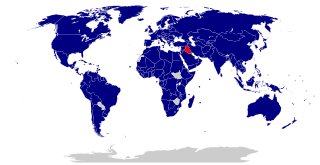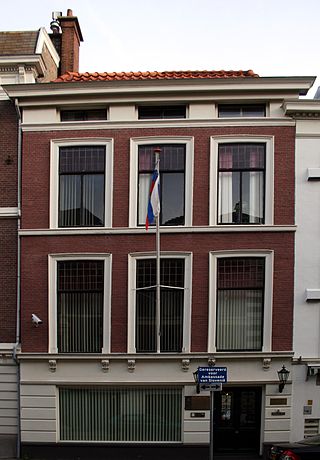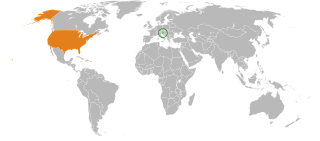
The Czech Republic is a Central European country, a member of the European Union, the Organisation for Economic Co-operation and Development (OECD), Organization for Security and Co-operation in Europe (OSCE), the North Atlantic Treaty Organization (NATO), the United Nations. It entertains diplomatic relations with 191 countries of the world, around half of which maintain a resident embassy in the Czech capital city, Prague.

The foreign relations of Ghana are controlled by the Ministry of Foreign Affairs of Ghana. Ghana is active in the United Nations and many of its specialised agencies, the World Trade Organization, the Non-Aligned Movement, the Organisation of African Unity (OAU), the African Union (AU) and the Economic Community of West African States. Ghana generally follows the consensus of the Non-aligned Movement and the OAU on economic and political issues not directly affecting its own interests. Ghana has been extremely active in international peacekeeping activities under UN auspices in Lebanon, Afghanistan, Rwanda, and the Balkans, in addition to an eight-year sub-regional initiative with its ECOWAS partners to develop and then enforce a cease-fire in Liberia. Ghana is also a member of the International Criminal Court.

Hungary wields considerable influence in Central and Eastern Europe and is a middle power in international affairs. The foreign policy of Hungary is based on four basic commitments: to Atlantic co-operation, to European integration, to international development and to international law. The Hungarian economy is fairly open and relies strongly on international trade.

Since 1980, the foreign relations of Iraq have been influenced by a number of controversial decisions by the Saddam Hussein administration. Hussein had good relations with the Soviet Union and a number of western countries such as France and Germany, who provided him with advanced weapons systems. He also developed a tenuous relation with the United States, who supported him during the Iran–Iraq War. However, the Invasion of Kuwait that triggered the Gulf War brutally changed Iraq's relations with the Arab World and the West. Egypt, Saudi Arabia, Syria and others were among the countries that supported Kuwait in the UN coalition. After the Hussein administration was toppled by the 2003 U.S. invasion, the governments that succeeded it have now tried to establish relations with various nations.

Kenya maintains relations with various countries around the world. Its closest ties are with its fellow Swahili-speaking neighbors in the African Great Lakes region. Swahili speaking neighbours mainly include countries in the East African Community such as Burundi, the DRC, Rwanda, South Sudan, Tanzania and Uganda.

Since its independence in 1961, Kuwait maintained strong international relations with most countries, especially nations within the Arab world. Its vast oil reserves gives it a prominent voice in global economic forums and organizations like the OPEC. Kuwait is also a major ally of ASEAN, a regional ally of China, and a major non-NATO ally.

Following independence in 1960, Mali initially followed a socialist path and was aligned ideologically with the communist bloc. Mali's foreign policy orientation became increasingly pragmatic and pro-Western over time. Since the institution of a democratic form of government in 1992, Mali's relations with the West in general and the United States in particular have improved significantly. U.S.-Malian relations are described by the U.S. Department of State as "excellent and expanding," especially given Mali's recent record of democratic stability in the volatile area of West Africa and its avowed support of the war on terrorism. Mali is reported to be one of the largest recipients of U.S. aid in Africa.

Namibia follows a largely independent foreign policy, with strong affiliations with states that aided the independence struggle, including Nigeria, Libya, and Cuba.

Since Slovenia declared independence in 1991, its Governments have underscored their commitment in improving cooperation with neighbouring countries and to actively contribute to international efforts aimed at bringing stability to Southeast Europe. Resource limitations have nevertheless been a problem hindering the efficiency of the Slovenian diplomacy. In the 1990s, foreign relations, especially with Italy, Austria and Croatia, triggered internal political controversies. In the last eight years, however, a wide consensus has been reached among the vast majority of Slovenian political parties to jointly work in the improvement of the country's diplomatic infrastructure and to avoid politicizing the foreign relations by turning them into an issue of internal political debates.

Physically bridging Europe and Asia, Turkey is a secular country that has pursued a Western-oriented foreign policy. To this end, Turkey uses its global diplomatic network—the fourth most extensive—of 246 diplomatic and consular missions.

The diplomatic foreign relations of the United Kingdom are conducted by the Foreign, Commonwealth and Development Office, headed by the Foreign Secretary. The prime minister and numerous other agencies play a role in setting policy, and many institutions and businesses have a voice and a role.
The foreign relations of Albania are its relations with other governments and peoples. Foreign relations are conducted through the Ministry of Foreign Affairs in Tirana. The current minister is Olta Xhaçka. The current Ambassador to the United Nations is Ferit Hoxha.

Foreign relations of Israel refers to diplomatic and trade relations between Israel and other countries around the world. Israel has diplomatic ties with 164 of the other 192 UN member states as of December 2020. Israel is a member of the United Nations (UN) and a number of other international organisations. Israel maintains full diplomatic relations with two of its Arab neighbours, Egypt and Jordan, after signing peace treaties in 1979 and 1994 respectively. In 2020, Israel signed agreements establishing diplomatic relations with four Arab League countries, Bahrain, the United Arab Emirates, Sudan and Morocco. As of 2021, Israel had formal diplomatic relations with 168 other countries, while twenty-eight UN member states have either never established, or have broken off diplomatic relations with Israel.

The Republic of Guinea-Bissau follows a nonaligned foreign policy and seeks friendly and cooperative relations with a wide variety of states and organizations. France, Portugal, Angola, Brazil, Egypt, Nigeria, Libya, Cuba, the Palestine Liberation Organization, Ghana, and Russia have diplomatic offices in Bissau.
The foreign relations of Canada are Canada's relations with other governments and nations. Canada is recognized as a middle power for its role in international affairs with a tendency to pursue multilateral solutions. Canada's foreign policy based on international peacekeeping and security is carried out through coalitions and international organizations, and through the work of numerous federal institutions. Canada's peacekeeping role during the 20th century has played a major role in shaping its global image. The Canadian government's foreign aid policy reflects an emphasis on meeting the Sustainable Development Goals, while also providing assistance in response to foreign humanitarian crises.

The United States has maintained an official presence in Slovenia since the early 1970s, when the United States Information Agency (USIS) opened a library and American press and cultural center in Ljubljana. From its opening through 1992, the American Center worked to develop closer grassroots relations between the United States and the people of the then-Socialist Republic of Slovenia, a constituent republic of the Socialist Federal Republic of Yugoslavia. On December 23, 1990, the Slovene people voted in a plebiscite to separate from greater Yugoslavia. On June 25, 1991, the new Republic of Slovenia officially declared its independence from the Federal Republic of Yugoslavia. A 10-day war commenced, during which Slovenian territorial troops fought off incursions by the Yugoslav People's Army. The United States formally recognized the new republic on April 7, 1992. To develop U.S. diplomatic relations with the new state, the United States opened a new Embassy in Ljubljana in August 1992. From the departure of Yousif Ghafari in January 2009 till November 2010, the U.S. Ambassador position was vacant. From November 2010 to 2015 it was held by Joseph A. Mussomeli. The Ambassador position is currently held by Jamie Harpootlian.

Russia–Slovenia relations are foreign relations between Russia and Slovenia. Both countries established diplomatic relations on May 25, 1992. Russia has an embassy in Ljubljana. Slovenia has an embassy in Moscow and two honorary consulates. Until 2022, Russia had five honorary consuls in Slovenia, but Slovenia withdrew its consent to the appointments due to the Russian invasion of Ukraine. Both countries are full members of the Council of Europe and the Organization for Security and Co-operation in Europe.

The 1955 Austrian State Treaty ended the four-power occupation and recognized Austria as an independent and sovereign state. In October 1955, the Federal Assembly passed a constitutional law in which "Austria declares of her own free will her perpetual neutrality." The second section of this law stated that "in all future times Austria will not join any military alliances and will not permit the establishment of any foreign military bases on her territory." Since then, Austria has shaped its foreign policy on the basis of neutrality.

E. Allan Wendt is an American diplomat. He was the first United States Ambassador to Slovenia from 1993 to 1995.
The Ukrainian Embassy in Ljubljana is the diplomatic mission of Ukraine in Slovenia. The embassy building is located at Mivka 27 in Ljubljana. The Ukrainian ambassador to Slovenia has been Andriy Taran since 2022.


















